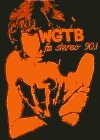
Washington
City Paper
Cover Story:
Radio Free
Georgetown
by Guy Raz
January 29
February 4
1999
 |
|
RADIO FREE GEORGETOWN
Michael Cullen, a shy and somewhat awkward 17-year-old, was a commuter student from Bethesda. He landed at Georgetown in September 1973, eager to join the "student radio station," hoping to use the experience as a springboard into the broadcasting industry. Cullen, who is now an audio engineer at National Public Radio, was interested in the technical side of broadcasting. During freshman orientation, he spotted a small sign advertising volunteer opportunities in WGTB's news department.
"Here was my entree," Cullen recalls. He walked down the steps of Copley, introduced himself, and was informed that before joining the "news collective," he would have to submit to an interview.
"I was asked how many 'demos' I had been to," he recalls. "I didn't know what that meant. They asked me about the NLF [the South Vietnamese National Liberation Front]. I didn't know what that was. I had no idea what a collective was!"
The station, it appeared, was not run by students at all. It was dominated by a collection of "community people"—the alternative community, that is. "I learned, right away, that the news department was being run as a Maoist collective," he says. Cullen was rejected.
The timid freshman shuffled out the door and waited at the gates for his father to pick him up. (At that time, if you lived within 25 miles of the university, you were required to be a commuter student.) "My father asks, 'So how was your thing at the radio station? When will you start working there?'" After a few minutes of shameful silence, Cullen told his father about the rejection. "I'm not paying all this money for nothing!" his father fumed. "Go back!"
The next day, Cullen returned to the station and introduced himself to an approachable, "straight-looking" fellow named Ken Sleeman. As general manager, Sleeman was thrilled to have Cullen on board. The station desperately needed to recruit Georgetown students because the university had stipulated that a majority of volunteers had to be enrolled at the university. "Stick with me," Sleeman told Cullen; he promised to teach the freshman all about radio engineering.
Pietrafesa was also enrolled at Georgetown, aiming to become a foreign service officer. Politically, however, she existed dimensions away from the likes of Cullen. Before her freshman year, she recalls, she had already formed an idealistic political consciousness, and her time at WGTB only radicalized her further.
Today, Pietrafesa is fragile and slightly weathered—in contrast with her energetic spirit at the time. She is still living, she says, according to the ideals of that time, inveighing against the "Establishment," organized religion, and political repression—though she herself has become part of that Establishment, working as an attorney in the Civil Rights Division of the Justice Department. She interposes recollections of her time at WGTB with sweeping statements illustrating her contemporary political outlook: "I don't care if there's more than one kind of toilet paper out there," she exclaims. "I'm just wiping my ass."
Pietrafesa, by all accounts, operated at the far end of an already extreme left-wing news collective. "We were biased for the North Vietnamese," she remembers. "In a war-torn zone, poor people will always go with those who provide food and clothing. We were with the poor."
Each weekday afternoon, Pietrafesa, Doherty, and a handful of other volunteers would scan through reports from alternative wire services and periodicals. Kurcias, who like Cullen is now an audio engineer at National Public Radio, would take the P Street bus to Georgetown, hopping off a few stops before the campus so he could steal a newspaper off the porch of one of Georgetown's stately homes. The floor of the station was typically littered with Black Panther newsletters, Native American magazines, and clips from the radical wire services Unicorn News and Liberation News Service, among others.
The news collective would decide—collectively—which stories to pursue for the evening's newscast. "We did a lot of stuff on Vietnam and Watergate, of course," says Pietrafesa. They covered more obscure controversies as well—the conflict in East Timor, the plight of Native Americans living on reservations—and stories with a somewhat conspiratorial slant, such as an allegation that the CIA printed its own money to cover expenses for covert operations, and also Nixon's alleged impotence.
As early as 1972, WGTB received national press attention for a promotional contest asking listeners to guess the date and time of Nixon's impeachment. The pitch opened with sound of Adolf Hitler addressing the Reichstag and segued into the presidential march "Ruffles and Feathers." "To those few responsible people left in Washington..." a voice boomed, asking listeners to send in replies. Members of the Grateful Dead, among others, sent in a postcard. The winner, who came pretty darn close to the actual date of the president's resignation, won a Gerald Ford dart board.
|